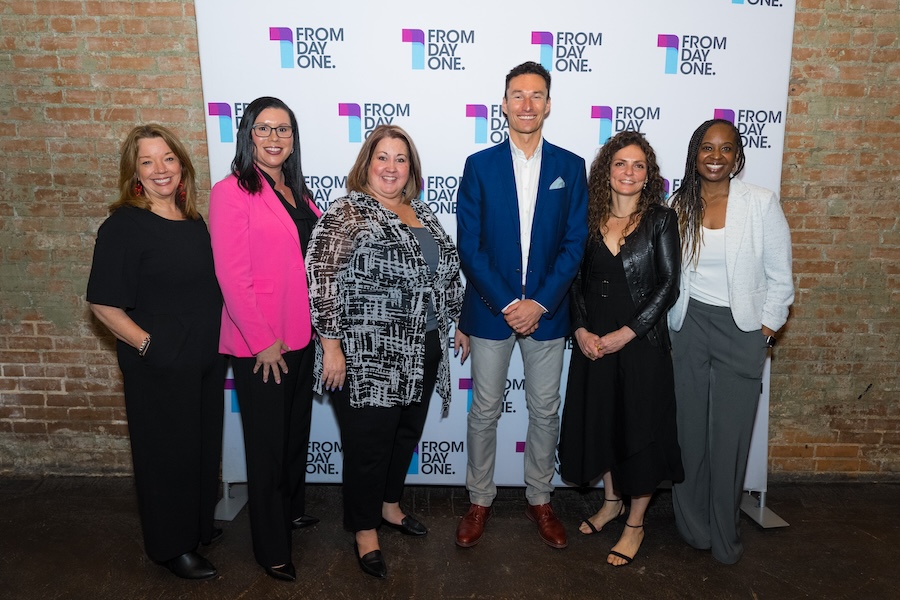Building Upon Workplace Culture Through Recognition, Inclusion, and Belonging


Railroads are not traditionally considered an industry welcoming to female workers, yet at BNSF Railway, women are seeing a future in railroading.
Kalisha Holland, chief diversity and inclusion officer and general director of talent acquisition at BNSF Railway, says that employee resource groups play a crucial role in fostering a culture of belonging. BNSF has 10 of these groups, but “we’ve taken it a step further,” said Holland during an executive panel conversation at From Day One’s Dallas conference.
Holland and fellow panelists discussed the topic “Building Upon Workplace Culture Through Recognition, Inclusion, and Belonging,” where they shared best practices for workplace belonging.
Creating Opportunities for All
In addition to plentiful ERG offerings, BNSF Railway has diversity councils across its entire network that allow union employees and management to “team up to not only work together to spread the message of diversity and inclusion, but also share our initiatives, talk through our resources, and act as sounding boards for things that might go unnoticed,” she said.
The diversity councils have made BNSF more welcoming for all employees, says Holland. She noted that “there’s not representation across genders” in the transportation field, so the company created groups designed to help women “feel like they are supported, giving them mentorship opportunities, making sure they have someone they can go to if they feel uncomfortable, or if they just want a place to unwind and give their honest feedback.”
Holland said the goal is to “spread the message that people at our company all have an opportunity to reach their full potential and can come to work every day and be their authentic selves, know that they're valued, and that they are in a safe space.”
The security field has traditionally been seen as male-dominated, but more than 73% of Allied employees are women. Part of the reason is the company’s emphasis on career development, says Kimberly Ardo-Eisenbeis, vice president of human resources and recruiting at Allied Universal Security Services.
“We offer robust training for all of our employees,” she said. “You don’t have to be a security professional to start with us. We’ll grow you to be one.” Allied employees are taught an ‘I Care’ approach to leadership, which Ardo-Eisenbeis said “is really about meeting our employees where they’re at, being flexible, being responsive, being open.” For example, Allied offers flexible scheduling, which is “nice for our female population,” Ardo-Eisenbeis said.
Attention to Detail
Inclusion also comes in the form of asking questions to get it right. Kaanji Irby, the director of diversity and inclusion for Signet Jewelers, is used to having her first name mispronounced. “I’ve been called everything from Kanga to Congo,” she said.
That’s why she appreciated it when a leader she’s worked with began every introduction with, “Hello, my name is Rich, can you please teach me how to say your name?”

Irby told moderator Christine Perez, editor of D CEO magazine, that she likes to share this story because “we all feel a connection to our names. So being in a space and working alongside a leader who intentionally took that time to make sure that he established that connection, and as the leader set the tone for everyone that he communicated with, I think is a true example of creating an inclusive environment.”
Getting Involved in Community
Ardo-Eisenbeis says that Allied Universal Security Services empowers employees to do volunteer work in their communities. For example, the Allied Midwest team developed its For You Campaign, in which employees volunteer at a local food band or school.
“That creates a culture of belonging,” Ardo-Eisenbeis said. “They feel seen, they feel heard. They’re building in their communities.”
Employees volunteering in the community can increase retention and productivity, but it's essential to do it year-round rather than have one big annual event, says Michal Alter, co-founder and CEO of Visit.org.
Alter says Visit.org corporate partners typically do weekly events in the community, as well as monthly events to celebrate different observances and international days for ERGs or new employee onboarding.
Visit.org regularly surveys participants in these types of events. According to the most recent survey of 40,000 responders, 70% said that the event “had a major impact on their sense of belonging to the company,” Alter said. “The second thing that we saw is that 90% of employees asked their employer to do more of these events.”
Measuring the Impact
A genuinely inclusive environment goes beyond looking at race and gender, says Adrian Seligman, executive board member and CCO of the Top Employers Institute. The company has “started getting into other areas that are a little more difficult” because success is more challenging to measure.
One of these areas is family-friendly policies, such as parental leave, which is less widespread in the United States than in other nations, says Seligman. He said South Korea is leading the way in this area, with new parents getting 54 weeks of fully paid leave.
Making sure neurodiverse job candidates and employees feel welcome is also a crucial part of inclusion, says Seligman.
“There are individuals who traditionally struggle with our standard recruitment processes who can really excel in some roles,” he said. “There’s just amazing talent out there, but how do we set up our workplaces to include talent like that?” This is the work the panelists continue to push forward.
Mary Pieper is a freelance writer based in Mason City, Iowa.
The From Day One Newsletter is a monthly roundup of articles, features, and editorials on innovative ways for companies to forge stronger relationships with their employees, customers, and communities.